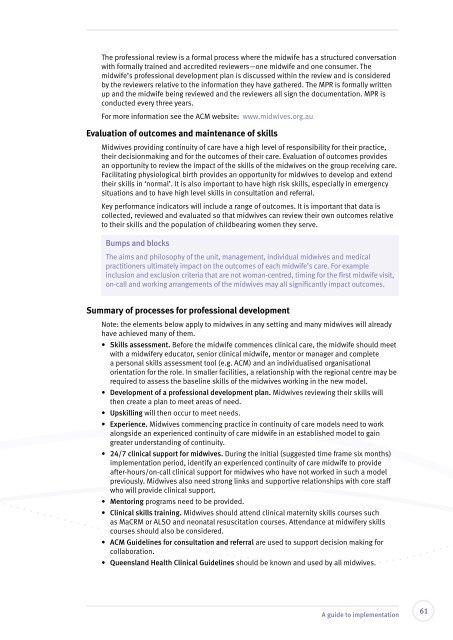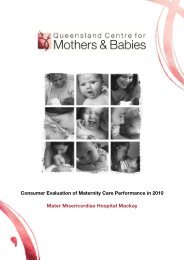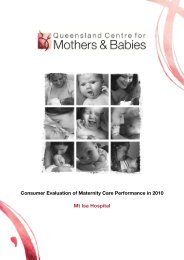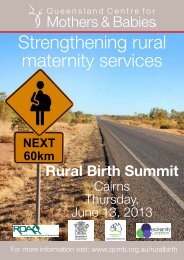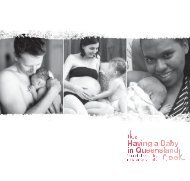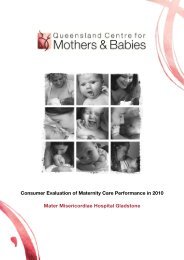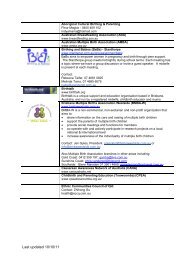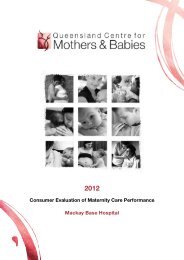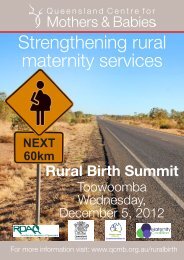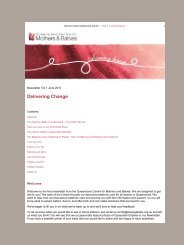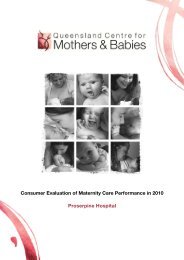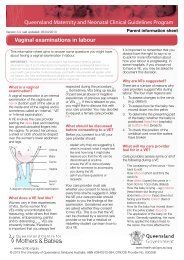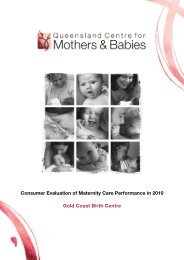Delivering continuity of midwifery care to Queensland women
Delivering continuity of midwifery care to Queensland women
Delivering continuity of midwifery care to Queensland women
Create successful ePaper yourself
Turn your PDF publications into a flip-book with our unique Google optimized e-Paper software.
The pr<strong>of</strong>essional review is a formal process where the midwife has a structured conversation<br />
with formally trained and accredited reviewers—one midwife and one consumer. The<br />
midwife’s pr<strong>of</strong>essional development plan is discussed within the review and is considered<br />
by the reviewers relative <strong>to</strong> the information they have gathered. The MPR is formally written<br />
up and the midwife being reviewed and the reviewers all sign the documentation. MPR is<br />
conducted every three years.<br />
For more information see the ACM website: www.midwives.org.au<br />
Evaluation <strong>of</strong> outcomes and maintenance <strong>of</strong> skills<br />
Midwives providing <strong>continuity</strong> <strong>of</strong> <strong>care</strong> have a high level <strong>of</strong> responsibility for their practice,<br />
their decisionmaking and for the outcomes <strong>of</strong> their <strong>care</strong>. Evaluation <strong>of</strong> outcomes provides<br />
an opportunity <strong>to</strong> review the impact <strong>of</strong> the skills <strong>of</strong> the midwives on the group receiving <strong>care</strong>.<br />
Facilitating physiological birth provides an opportunity for midwives <strong>to</strong> develop and extend<br />
their skills in ‘normal’. It is also important <strong>to</strong> have high risk skills, especially in emergency<br />
situations and <strong>to</strong> have high level skills in consultation and referral.<br />
Key performance indica<strong>to</strong>rs will include a range <strong>of</strong> outcomes. It is important that data is<br />
collected, reviewed and evaluated so that midwives can review their own outcomes relative<br />
<strong>to</strong> their skills and the population <strong>of</strong> childbearing <strong>women</strong> they serve.<br />
Bumps and blocks<br />
The aims and philosophy <strong>of</strong> the unit, management, individual midwives and medical<br />
practitioners ultimately impact on the outcomes <strong>of</strong> each midwife’s <strong>care</strong>. For example<br />
inclusion and exclusion criteria that are not woman-centred, timing for the first midwife visit,<br />
on-call and working arrangements <strong>of</strong> the midwives may all significantly impact outcomes.<br />
Summary <strong>of</strong> processes for pr<strong>of</strong>essional development<br />
Note: the elements below apply <strong>to</strong> midwives in any setting and many midwives will already<br />
have achieved many <strong>of</strong> them.<br />
• Skills assessment. Before the midwife commences clinical <strong>care</strong>, the midwife should meet<br />
with a <strong>midwifery</strong> educa<strong>to</strong>r, senior clinical midwife, men<strong>to</strong>r or manager and complete<br />
a personal skills assessment <strong>to</strong>ol (e.g. ACM) and an individualised organisational<br />
orientation for the role. In smaller facilities, a relationship with the regional centre may be<br />
required <strong>to</strong> assess the baseline skills <strong>of</strong> the midwives working in the new model.<br />
• Development <strong>of</strong> a pr<strong>of</strong>essional development plan. Midwives reviewing their skills will<br />
then create a plan <strong>to</strong> meet areas <strong>of</strong> need.<br />
• Upskilling will then occur <strong>to</strong> meet needs.<br />
• Experience. Midwives commencing practice in <strong>continuity</strong> <strong>of</strong> <strong>care</strong> models need <strong>to</strong> work<br />
alongside an experienced <strong>continuity</strong> <strong>of</strong> <strong>care</strong> midwife in an established model <strong>to</strong> gain<br />
greater understanding <strong>of</strong> <strong>continuity</strong>.<br />
• 24/7 clinical support for midwives. During the initial (suggested time frame six months)<br />
implementation period, identify an experienced <strong>continuity</strong> <strong>of</strong> <strong>care</strong> midwife <strong>to</strong> provide<br />
after-hours/on-call clinical support for midwives who have not worked in such a model<br />
previously. Midwives also need strong links and supportive relationships with core staff<br />
who will provide clinical support.<br />
• Men<strong>to</strong>ring programs need <strong>to</strong> be provided.<br />
• Clinical skills training. Midwives should attend clinical maternity skills courses such<br />
as MaCRM or ALSO and neonatal resuscitation courses. Attendance at <strong>midwifery</strong> skills<br />
courses should also be considered.<br />
• ACM Guidelines for consultation and referral are used <strong>to</strong> support decision making for<br />
collaboration.<br />
• <strong>Queensland</strong> Health Clinical Guidelines should be known and used by all midwives.<br />
A guide <strong>to</strong> implementation<br />
61


